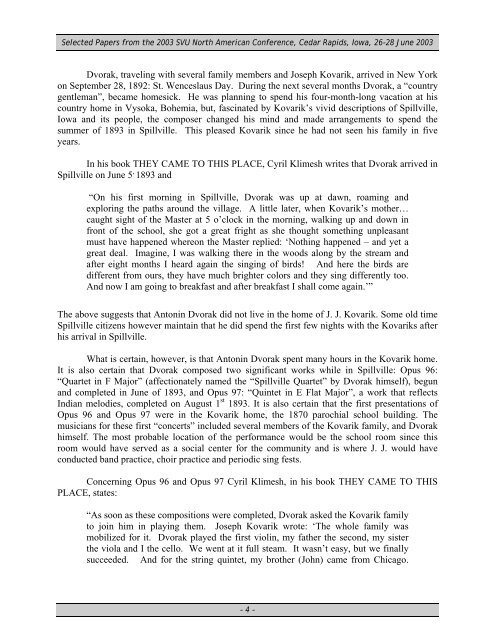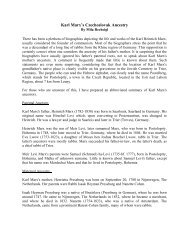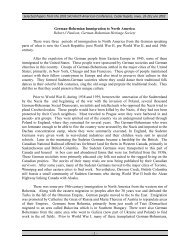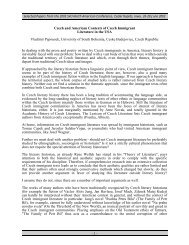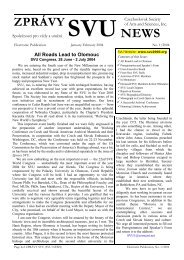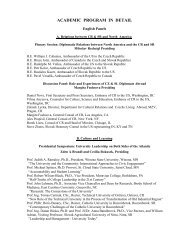Oh, if only these walls could speak - Czechoslovak Society of Arts ...
Oh, if only these walls could speak - Czechoslovak Society of Arts ...
Oh, if only these walls could speak - Czechoslovak Society of Arts ...
Create successful ePaper yourself
Turn your PDF publications into a flip-book with our unique Google optimized e-Paper software.
Selected Papers from the 2003 SVU North American Conference, Cedar Rapids, Iowa, 26-28 June 2003<br />
Dvorak, traveling with several family members and Joseph Kovarik, arrived in New York<br />
on September 28, 1892: St. Wenceslaus Day. During the next several months Dvorak, a “country<br />
gentleman”, became homesick. He was planning to spend his four-month-long vacation at his<br />
country home in Vysoka, Bohemia, but, fascinated by Kovarik’s vivid descriptions <strong>of</strong> Spillville,<br />
Iowa and its people, the composer changed his mind and made arrangements to spend the<br />
summer <strong>of</strong> 1893 in Spillville. This pleased Kovarik since he had not seen his family in five<br />
years.<br />
In his book THEY CAME TO THIS PLACE, Cyril Klimesh writes that Dvorak arrived in<br />
Spillville on June 5 , 1893 and<br />
“On his first morning in Spillville, Dvorak was up at dawn, roaming and<br />
exploring the paths around the village. A little later, when Kovarik’s mother…<br />
caught sight <strong>of</strong> the Master at 5 o’clock in the morning, walking up and down in<br />
front <strong>of</strong> the school, she got a great fright as she thought something unpleasant<br />
must have happened whereon the Master replied: ‘Nothing happened – and yet a<br />
great deal. Imagine, I was walking there in the woods along by the stream and<br />
after eight months I heard again the singing <strong>of</strong> birds! And here the birds are<br />
d<strong>if</strong>ferent from ours, they have much brighter colors and they sing d<strong>if</strong>ferently too.<br />
And now I am going to breakfast and after breakfast I shall come again.’”<br />
The above suggests that Antonin Dvorak did not live in the home <strong>of</strong> J. J. Kovarik. Some old time<br />
Spillville citizens however maintain that he did spend the first few nights with the Kovariks after<br />
his arrival in Spillville.<br />
What is certain, however, is that Antonin Dvorak spent many hours in the Kovarik home.<br />
It is also certain that Dvorak composed two sign<strong>if</strong>icant works while in Spillville: Opus 96:<br />
“Quartet in F Major” (affectionately named the “Spillville Quartet” by Dvorak himself), begun<br />
and completed in June <strong>of</strong> 1893, and Opus 97: “Quintet in E Flat Major”, a work that reflects<br />
Indian melodies, completed on August 1 st 1893. It is also certain that the first presentations <strong>of</strong><br />
Opus 96 and Opus 97 were in the Kovarik home, the 1870 parochial school building. The<br />
musicians for <strong>these</strong> first “concerts” included several members <strong>of</strong> the Kovarik family, and Dvorak<br />
himself. The most probable location <strong>of</strong> the performance would be the school room since this<br />
room would have served as a social center for the community and is where J. J. would have<br />
conducted band practice, choir practice and periodic sing fests.<br />
Concerning Opus 96 and Opus 97 Cyril Klimesh, in his book THEY CAME TO THIS<br />
PLACE, states:<br />
“As soon as <strong>these</strong> compositions were completed, Dvorak asked the Kovarik family<br />
to join him in playing them. Joseph Kovarik wrote: ‘The whole family was<br />
mobilized for it. Dvorak played the first violin, my father the second, my sister<br />
the viola and I the cello. We went at it full steam. It wasn’t easy, but we finally<br />
succeeded. And for the string quintet, my brother (John) came from Chicago.<br />
- 4 -


